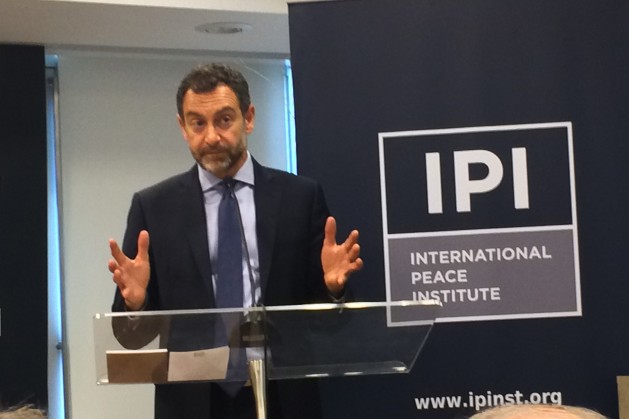Insecurity Fuelling Food Shortages in Lake Chad Basin: UN Coordinator
AFRICA, 6 Feb 2017
Lyndal Rowlands – Inter Press Service-IPS

Toby Lanzer, UN Assistant Secretary-General and Regional Humanitarian Coordinator for the Sahel speaks at the International Peace Institute. Credit: L Rowlands / IPS.
30 Jan 2017 – Children less than five years of age are not surviving due to severe food shortages in some parts of the Lake Chad region, says Toby Lanzer, UN Assistant Secretary-General and Regional Humanitarian Coordinator for the Sahel.
“I saw adults sapped of energy who couldn’t stand up, I saw an entire town devoid of two-year olds, three-year olds, four-year olds, and when we asked where the children are – and I get upset when I say this – we were told that they had died, they had starved.”
This was the situation Lanzer saw on a visit to the town of Bama in Northern Nigeria in 2016. He described the visit at a discussion with policy makers, diplomats and journalists at the International Peace Institute – a New York think tank – on Wednesday 25 January.
Communities across the Lake Chad basin have lost the last three planting seasons – Toby Lanzer.
The crisis has left millions of people living on the edge in the Lake Chad basin, due to a combination of abject poverty, climate change and violent extremism, said Lanzer. Four countries – Chad, Cameroon, Niger, and Nigeria – border Lake Chad, which has shrunk dramatically since the 1960s.
“Around Lake Chad there are now well over 10 million people who I could categorise as desperately in need of … life-saving aid,” he said, including 7.1 million people categorised as “severely food insecure.”
In response to a question from IPS, Lanzer described how ongoing violence in the region has contributed to the food shortages:
“About 85 percent of people across this part of the world depend on the weather and agriculture livestock – it’s an agro-pastoralist community.”
“If your movement is confined you may not plant and communities across the Lake Chad basin have lost the last three planting seasons if you don’t plant than you don’t harvest and if you don’t harvest than you don’t have food,” he said.
“If your cattle or your goats or your livestock isn’t moving cows that don’t walk get sick and they die and then you’ve lost your livelihood,” he added.
Lanzer, whose humanitarian career has seen him work in Sudan, South Sudan, Timor-Leste, and the Central African Republic said that the poverty in the Lake Chad region is some of the worst he has witnessed.
“I don’t think I’ve been to villages before where people don’t have flip-flops, where people don’t have plastic,” he said.
However Lanzer noted that ongoing violence in the region – including due to extremist group Boko Haram – was one of the biggest factors disrupting the lives of people in the region.
Els Debuf, Senior Adviser and Head of Humanitarian Affairs at the International Peace Institute said that although the crisis in the Lake Chad region is one of the most severe it is also one of the most under-reported.
She noted that despite the region’s extreme poverty, communities were also sheltering refugees and internally displaced persons:
“Close to two and half million refugees and internally displaced people – the vast majority of whom are children – are sheltered throughout the region by communities who are themselves among the poorest and most vulnerable in the world,” she said.
The governments of Norway, Nigeria and Germany are planning a pledging conference to raise funds for the crisis in Nigeria and the Lake Chad region on 24 February in Oslo, Norway.
DISCLAIMER: The statements, views and opinions expressed in pieces republished here are solely those of the authors and do not necessarily represent those of TMS. In accordance with title 17 U.S.C. section 107, this material is distributed without profit to those who have expressed a prior interest in receiving the included information for research and educational purposes. TMS has no affiliation whatsoever with the originator of this article nor is TMS endorsed or sponsored by the originator. “GO TO ORIGINAL” links are provided as a convenience to our readers and allow for verification of authenticity. However, as originating pages are often updated by their originating host sites, the versions posted may not match the versions our readers view when clicking the “GO TO ORIGINAL” links. This site contains copyrighted material the use of which has not always been specifically authorized by the copyright owner. We are making such material available in our efforts to advance understanding of environmental, political, human rights, economic, democracy, scientific, and social justice issues, etc. We believe this constitutes a ‘fair use’ of any such copyrighted material as provided for in section 107 of the US Copyright Law. In accordance with Title 17 U.S.C. Section 107, the material on this site is distributed without profit to those who have expressed a prior interest in receiving the included information for research and educational purposes. For more information go to: http://www.law.cornell.edu/uscode/17/107.shtml. If you wish to use copyrighted material from this site for purposes of your own that go beyond ‘fair use’, you must obtain permission from the copyright owner.